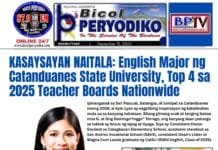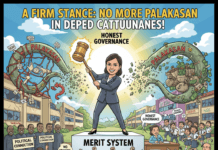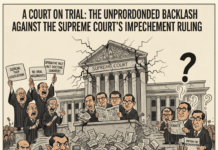By: Ferdz M. Brizo | FB EYE | Bicol Peryodiko Weekly
The battle for citizenship in Catanduanes has taken center stage, with Dr. Patrick Azanza officially filing a petition before the Commission on Elections (Comelec) to challenge the eligibility of Vice Governor Peter C. Cua.
This legal dispute is not just a political controversy but also an opportunity for the people of Catanduanes to gain a deeper understanding of citizenship laws and election qualifications. The outcome of this case could have far-reaching implications for local politics, especially as the province prepares for the next electoral cycle.
Azanza’s petition asserts that Vice Governor Cua is not qualified to hold public office, arguing that he remains a Chinese national. The crux of the argument revolves around the naturalization of Cua’s father, Fernando Chua, whose citizenship status has been in question for years. If it is proven that his naturalization was not valid, then Peter Cua’s claim to Filipino citizenship—and, by extension, his eligibility to run for office—could be nullified.
This issue is not new. Questions regarding the Cua family’s citizenship status were first raised as early as 2013, when former Governor Araceli Wong contested incumbent Governor Joseph Cua in the post. Wong, for the first time, won the governorship. However, no decisive action was taken at the time, allowing the controversy to linger. Now, with Azanza formally challenging Peter Cua’s eligibility, the issue has resurfaced and demands a clear legal resolution.
The stakes are high, as this case could potentially trigger a wave of disqualification petitions against other public officials. Some observers believe that the current governor, Joseph C. Cua, may also be affected should questions about the family’s naturalization extend beyond Peter Cua. If the Comelec rules against Peter, it could open the door for further scrutiny of other elected officials with similar circumstances.
Beyond its political implications, this case underscores the importance of strict adherence to election laws and constitutional requirements. The right to run for public office is a fundamental aspect of democracy, but it must be exercised within the bounds of legality. Any ambiguity in a candidate’s qualifications must be clarified to ensure that only those who meet the constitutional requirements are allowed to serve.
The Comelec now faces the critical task of resolving this issue with urgency and transparency. A prolonged legal battle could turn this case into a central narrative in the upcoming elections, potentially distracting voters from key governance and policy issues. The sooner the matter is settled, the better it will be for the province’s political stability.
On the other hand, the legal challenge brought by Azanza highlights the broader issue of how citizenship laws are interpreted and enforced in the country. It raises questions about whether the government has sufficiently monitored and verified the naturalization process of individuals who later assume public office. This case could set a precedent for future eligibility challenges and influence how similar cases are handled moving forward.
Ultimately, the people of Catanduanes deserve a fair and just resolution to this controversy. The rule of law must prevail, and the Comelec must ensure that its decision is based on solid legal grounds. Whether this case results in disqualification or exoneration, its outcome will undoubtedly shape the province’s political landscape for years to come.





















